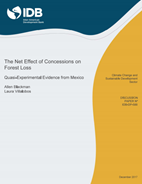The Net Effect of Concessions on Forest Loss: Quasi-Experimental Evidence from Mexico
Date
Dec 2017
Rapid deforestation remains a pressing problem in much of the global South and has severe environmental and socioeconomic consequences. Policies aimed at addressing this problem have historically focused on ‘land sparing’: prohibiting some or all extractive activities in specified locations, such as protected areas. An alternative approach is ‘land sharing’: improving supervision and management of extractive activities. Timber extraction can be managed in ways that significantly reduce forest loss, by, for example, relying on selection logging instead of clearcutting and extending logging rotations. Probably more important, forests that are well managed for extraction may discourage illegal logging and land-use change. Hence, in principle, forest concessions can reduce as well as encourage forest loss, and their net effect is an empirical question. Limited rigorous evidence is available to measure net effects. We use remotely sensed forest loss panel data, detailed information on hundreds of forestry concessions, and quasi-experimental methods (matched difference-in-differences) to measure the net effect of concessions on forest loss in Mexico. Results from an initial analysis indicate that although we test for a variety of temporal and subgroup effects, we are unable to reject the null hypothesis that concessions have no net effect on forest loss. It is important to emphasize that these results are preliminary and subject to revision.




